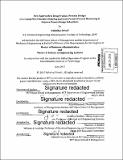New approach to drug product process design : leveraging first principles modeling and cross-product process monitoring to improve process design robustness
Author(s)
Srivali, Nahathai
DownloadFull printable version (9.845Mb)
Alternative title
Leveraging first principles modeling and cross-product process monitoring to improve process design robustness
Other Contributors
Leaders for Global Operations Program.
Advisor
Arnold Barnett and Anthony Sinskey.
Terms of use
Metadata
Show full item recordAbstract
Abstract The vision of the Operations Technology Group at Amgen is to enable a robust pipeline through focused and efficient operations research studies. Process design is traditionally developed by performing experiments, but other approaches can be used to improve cost, efficiency, and robustness. The scope of this internship included the use of First Principles, Computational Fluid Dynamics (CFD), and Cross-Product Process Monitoring (CPPM) to improve process design robustness with reduced testing and faster development cycle. The project focused specifically on the drug product development network, which included the development of processes from formulation to filling and finishing, clinical manufacturing, and technology transfer to commercial manufacturing The goal of this internship was to explore opportunities to utilize First Principles, CFD, and CPPM in drug product process design space. First Principles and CFD modeling tools were used to look into the physics of drug product filling process (specifically parameters influencing two key filling issues - drying during line stoppage and dripping between fills). Criteria for analyzing cost and benefits for the use of First Principles were also provided as strategic recommendations on where the new approach should be utilized. Clinical data were leveraged, with multivariate statistical data analysis, to determine inspection reject limit for the purpose of process monitoring and root cause analysis.
Description
Thesis: M.B.A., Massachusetts Institute of Technology, Sloan School of Management, 2015. In conjunction with the Leaders for Global Operations Program at MIT. Thesis: S.M., Massachusetts Institute of Technology, Engineering Systems Division, 2015. In conjunction with the Leaders for Global Operations Program at MIT. Cataloged from PDF version of thesis. Includes bibliographical references (pages 88-89).
Date issued
2015Department
Leaders for Global Operations Program at MIT; Massachusetts Institute of Technology. Engineering Systems Division; Sloan School of ManagementPublisher
Massachusetts Institute of Technology
Keywords
Sloan School of Management., Engineering Systems Division., Leaders for Global Operations Program.